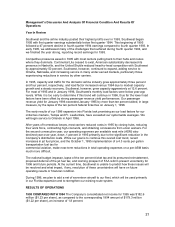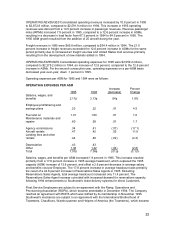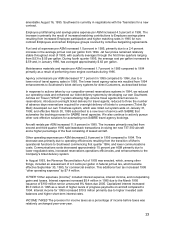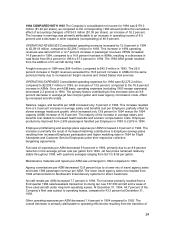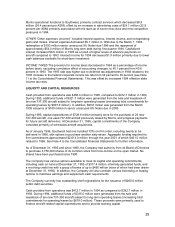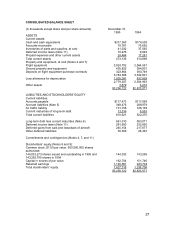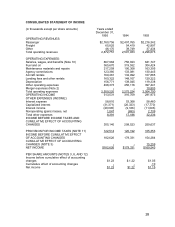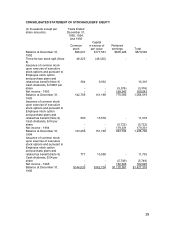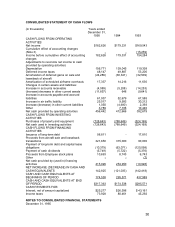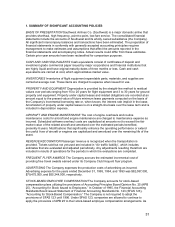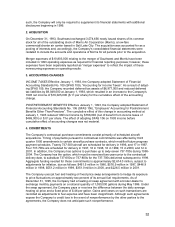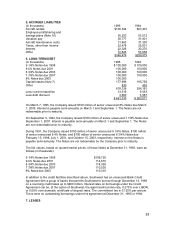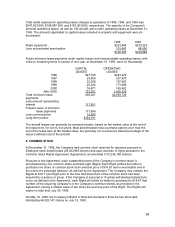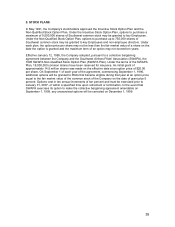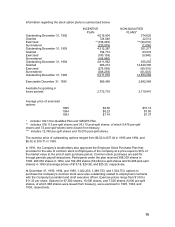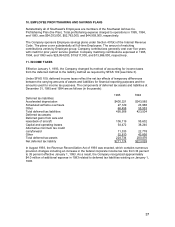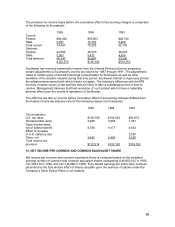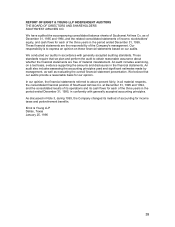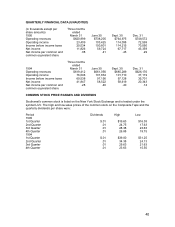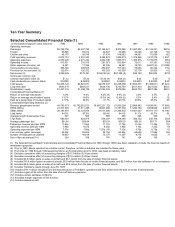Southwest Airlines 1995 Annual Report Download - page 31
Download and view the complete annual report
Please find page 31 of the 1995 Southwest Airlines annual report below. You can navigate through the pages in the report by either clicking on the pages listed below, or by using the keyword search tool below to find specific information within the annual report.31
1. SUMMARY OF SIGNIFICANT ACCOUNTING POLICIES
BASIS OF PRESENTATION Southwest Airlines Co. (Southwest) is a major domestic airline that
provides shorthaul, high frequency, point-to-point, low-fare service. The consolidated financial
statements include the accounts of Southwest and its wholly owned subsidiaries (the Company).
All significant intercompany balances and transactions have been eliminated. The preparation of
financial statements in conformity with generally accepted accounting priniciples requires
management to make estimates and assumptions that affect the amounts reported in the
financial statements and accompanying notes. Actual results could differ from these estimates.
Certain prior year amounts have been reclassified for comparison purposes.
CASH AND CASH EQUIVALENTS Cash equivalents consist of certificates of deposit and
investment grade commercial paper issued by major corporations and financial institutions that
are highly liquid and have original maturity dates of three months or less. Cash and cash
equivalents are carried at cost, which approximates market value.
INVENTORIES Inventories of flight equipment expendable parts, materials, and supplies are
carried at average cost. These items are charged to expense when issued for use.
PROPERTY AND EQUIPMENT Depreciation is provided by the straight-line method to residual
values over periods ranging from 15 to 20 years for flight equipment and 3 to 30 years for ground
property and equipment. Property under capital leases and related obligations are recorded at an
amount equal to the present value of future minimum lease payments computed on the basis of
the Company’s incremental borrowing rate or, when known, the interest rate implicit in the lease.
Amortization of property under capital leases is on a straight-line basis over the lease term and is
included in depreciation expense.
AIRCRAFT AND ENGINE MAINTENANCE The cost of engine overhauls and routine
maintenance costs for aircraft and engine maintenance are charged to maintenance expense as
incurred. Scheduled airframe overhaul costs are capitalized at amounts not to exceed the fair
market value of the related aircraft and amortized over the estimated periods benefited,
presently 8 years. Modifications that significantly enhance the operating performance or extend
the useful lives of aircraft or engines are capitalized and amortized over the remaining life of the
asset.
REVENUE RECOGNITION Passenger revenue is recognized when the transportation is
provided. Tickets sold but not yet used are included in “Air traffic liability”, which includes
estimates that are evaluated and adjusted periodically. Any adjustments resulting therefrom are
included in results of operations for the periods in which the evaluations are completed.
FREQUENT FLYER AWARDS The Company accrues the estimated incremental cost of
providing free travel awards earned under its Company Club frequent flyer program.
ADVERTISING The Company expenses the production costs of advertising as incurred.
Advertising expense for the years ended December 31, 1995, 1994, and 1993 was $92,087,000,
$79,475,000, and $55,344,000, respectively.
STOCK-BASED EMPLOYEE COMPENSATION The Company accounts for stock-based
compensation plans utilizing the provisions of Accounting Principles Board Opinion No. 25 (APB
25), “Accounting for Stock Issued to Employees.” In October of 1995, the Financial Accounting
Standards Board issued Statement of Financial Accounting Standards No. 123 (SFAS 123),
“Accounting for Stock-Based Compensation.” The Company is not required to adopt the
provisions of SFAS 123 until 1996. Under SFAS 123, companies are allowed to continue to
apply the provisions of APB 25 to their stock-based employee compensation arrangements. As


